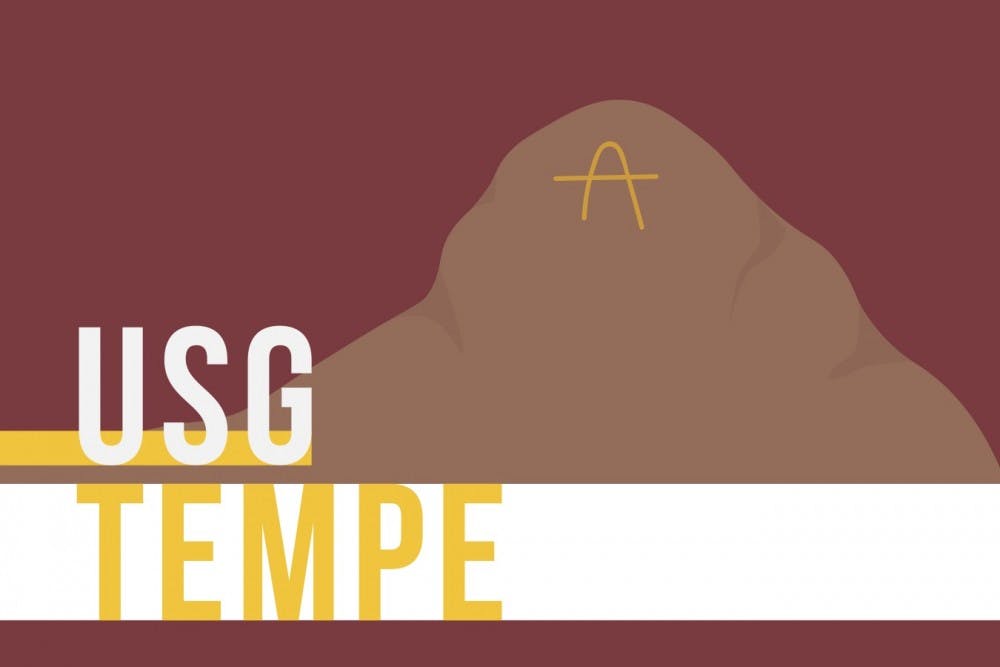On Tuesday, Undergraduate Student Government Tempe held their bi-weekly meeting where four potential senate resolutions were made public and discussed with students and senate members in an unusual night for the senate.
Senate members hoped to propose the resolutions at this meeting, but the senate president decided to delay the resolutions due to grammatical and potential legal errors.
Each resolution deals with issues affecting the political climate on campus in recent weeks, and students felt strongly about the resolutions, resulting in a larger student turnout to the meeting than usual.
Resolution 12 states that ASU should stand in support for Scott Warren, while Resolution 13 is calling for support for Deferred Action for Childhood Arrivals recipients.
Resolution 14 calls for a warning to students if Immigration and Customs Enforcement and U.S. Customs and Border Protection will be on campus.
Resolution 15 states that USGT will not host nor contract with career fairs or companies that are "involved in the manufacture and sale of weapons or the Israel occupation of the West Bank."
Held in the Memorial Union on the Union Stage, the meeting room quickly reached full capacity and incoming students were told they could not enter. The students sat outside of the room and watched the meeting on a livestream on USGT's Instagram.
USGT Senate President Dominic Frattura, a junior majoring in business with a focus in global politics, began the senate meeting with a statement informing the audience that the resolutions are not yet to be considered and that the issues within the resolutions are being addressed by senate members.
"I recognize that this is in light of recent events on campus and in full transparency, I want to share with the group there were four resolutions that were put on my desk Friday afternoon," Frattura said.
He said the delay in addressing the resolutions is, " ... mainly because USGT senate is a non-partisan organization and does not adopt political stances on foreign affairs, legal concerns and the such."
Frattura said the purpose of USG is not to be a public policy debating forum even though some of the controversial policy issues can be connected to ASU. He then called to the audience after the majority voted to approve the agenda as is, allowing the attendees a chance to address the senate with any comments or concerns.
Many of those in the audience participated in speaking to the senate, voicing their thoughts on the recent resolutions in the legislation.
Students from many on-campus organizations including College Republicans, Students Supporting Israel and Hillel ASU were in attendance and spoke during their allotted times.
Junior Maxim Quint, a civic and economic thought and leadership major and the president of Barrett, the Honors College Council, came to the senate meeting as a private citizen and clarified that while he is a representative of Barrett, the statement he gave is his own personal belief and is not shared by the entire council.
"To me, the Israeli-Palestinian peace process is very important and the other three bills are very important," said Quint. "I know that if we actually sit around and speak with one another instead of mass demonstrations, taking over rooms, name-calling on both sides of this issue and respect each other fundamentally as human beings, we will really get rid of this (hatred)."
Some students attended specifically to speak out against the resolutions.
In an email statement, President of SunPAC, Daniel Magat, a senior majoring in political science, felt that it was important to let the senate know how the community feels.
"We came into the meeting organized and prepared to speak out against a BDS resolution that would be divisive and contribute to a hostile environment on campus,” Magat said. "By speaking in front of the senate, students like myself were able to express our views and let the Senate know that our voices matter, deserve to be heard and that the pro-Israel students on campus won’t be intimidated into silence."
Judah Waxelbaum, a junior majoring in political science and the chairperson of Arizona Federation of College Republicans, attended the meeting because he is a member of the Jewish community and was hopeful that USGT would be "courageous and reject anti-semitism at ASU."
In regard to the resolutions being pushed, Waxelbaum was quite surprised and voiced the concerns that the legislation push back may be an effort to address the legislation with a smaller audience.
"Jewish ASU students have a right to feel safe on campus and right now, they do not feel safe. If USG(T) supports (the BDS movement), they are complicit in supporting that danger. Any support of BDS on campus is opening the door to endangering Jewish students."
There were also clubs that showed support for the proposed resolutions.
President of No Más Muertes ASU and junior MaryKelly Starrs, a global health major, said the backlash to this proposed legislation has unfortunately been met with Jewish groups on campus who claim it is anti-Semitic, which she does not agree with.
“These groups tend to only accept one side and if you disagree with anything you are smeared and labeled anti-semitic,” Starrs said. “This BDS resolution is important because it not only promotes awareness of the violation of human rights Palestinians have been facing but it gives voices to more Jewish students who are critical of Israel and its use of terror and apartheid-like policies.”
She said they are not attacking students for being Jewish, they are fighting funding that further helps Israel violate human rights and the right of the Palestinians to self-determination.
“Human rights and violations of that do not deserve to be cherry picked based upon what suits the current political climate,” Starrs said. “We must always fight against any injustice and that includes fighting against anti-semitism and fighting for the rights of Palestinians as well."
Freshman Emily Lopez Chavarria, a conservation biology and ecology major and the social media coordinator for Students for Socialism, attended the USGT meeting in support of the resolutions that were put forth in support of Palestine and DACA and against ICE.
“We fully support the resolution because USGT must take a stance on the Palestinian struggle for national liberation, and they can do so by taking the stance in support of BDS,” Lopez Chavarria said. “If USGT were to take a stance on this issue, it could highlight the fact that ASU is heavily invested in the Israeli state.”
Lopez Chavarria also said the delay is an act of suppression against the pro-Palestinian community.
She said that Students for Socialism believe the resolutions being pushed for the next meeting “was a ridiculous attempt to exclude Senator (Benjamin) Cooper’s proposals and give the University more time to push it to the back burner.”
USGT Student Body President, senior Hanna Salem who is studying public policy and public service, said in an email statement that the discussion and debate among the students was an opportunity for them to express their concerns and to speak with their elected leaders on campus.
These resolutions will be voted on at the next senate meeting on Dec. 3 at 6 p.m. in the MU Union Stage.
Editor's Note: Benjamin Cooper was a former State Press employee. He had no involvement with the reporting or writing in this article.
Reach the reporter at nnano@asu.edu and follow @halentinos on Twitter.
Like The State Press on Facebook and follow @statepress on Twitter.




